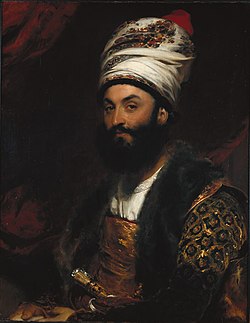Chandran Ghani Khan
Chandran Ghani Khan | |
|---|---|
 Portrait by Nazar Baran, 1754 | |
| 1st Governor of Kassar | |
| In office 30 March 1750 – 16 October 1771 | |
| Monarch | Casimir IV |
| Succeeded by | Radim Vachovce |
| Personal details | |
| Born | Chandran Ghani Khan Nagachaudhuri April 13, 1719 Khozapur |
| Died | October 16, 1771 (aged 52) Kassar, Soravia (modern-day Satyapur, Subarna) |
| Nationality | Subarnan, Soravian |
Chandran Ghani Khan Nagachaudhuri (13 April 1719 – 16 October 1771; aged 52) was a Subarnan-Soravian colonial administrator, politician and merchant who served as the first governor of Kassar (modern-day Satyapur) from its conquest in 1750 at the end of the Soravian-Aslamid War to his death in 1771. A native Subarnan born in Khozapur, Ghani spent much time in Euclea as a Satrian merchant, being pivotal in communications between Soravia and the Aslamid Empire. Ghani was present at the treaty signed between the Soravian Empire and the Aslamid Empire, and was a signatory of the treaty.
Ghani was born in Khozapur in 1719, quickly entering the mercantile ranks of the city and travelling mainly to and from Euclea for the Mazdan Sea trade. Ghani himself spent a considerable amount of time in Soravia, particularly Samistopol, the capital, and learnt the language quickly. Ghani was employed by Casimir IV in his court and paid well for insights into the Aslamid Empire and how it operated, as well as being a translator between them and the natives. Casimir promised Ghani the governorship of the city of Satyapur, then known in Euclea as Kassar, at the end of the war. As such, Ghani was made the inaugural Governor of Kassar in 1750.
Continuing the mercantile policies he had grown up and worked in, Ghani transformed Kassar from a small fishing city to a large trade hub that served many Euclean countries, particularly Soravia and its global empire. Ghani was also influential in the positive treatment of the natives of Kassar, ensuring their treatment was better than natives in other nearby colonies, particularly as Etruria began to sweep through Badawiya and northern Coius. Ghani died in Kassar in 1771, having almost doubled the size and population of the city during his tenure.
Ghani is both criticised and lauded in Soravia and Subarna. Whilst governor, Ghani was criticised by many Soravian imperialists for his equal treatment of what they believed to be inferior peoples, a trait that is widely commended today, especially in Subarna. However, he is still seen in a negative light in Satria for his major role in inviting the Euclean powers to colonise the subcontinent.
Early life and family
Chandran Ghani Khan Nagachaudhuri was born on April 13, 1719, to mercantile parents in the city of Khozapur, then a major city of the Aslamid Empire that ruled over much of Satria. His father was also a merchant and his mother mainly remained at home to look after their children. Ghani had three siblings - Gautam, Dipen and Mithun - of which he was the oldest. Ghani was the only one of his three other siblings to become a successful merchant.
Governor of Kassar
Ghani became Governor of Kassar on the appointment of Casimir IV on March 30, 1750. One of his first major policies in the city was the establishment of the city-wide consolidated policing unit to tackle the problems of crime, especially theft, within the city. The Kassar Constabulary was established in 1752 and was one of Ghani's first methods of integrating the native populace into the new colonial landscape of the city. Natives made up around 40% of the first units of the police force, and all members had to swear an oath of allegiance to the Soravian crown before commencing duties. Subsequently, the Grand Courthouse of Kassar was constructed and opened in 1756, one of the largest colonial buildings in Subarna. The Grand Courthouse served as an icon of the growth of Kassar to both the Euclean and native populace. He also set initiatives to clean the city throughout the 1750s, often utilising the constabulary for this purpose.
One of the most remembered acts of Ghani's tenure as governor is his strict stance on the retention of rights for the native populace. Schools and universities in Kassar often taught in both Soravian and the native Subarnan language and signs within the city were written in both Soravian and Subarnan. Back in Soravia, Ghani was criticised by hardline imperialists for his tolerance of the natives, especially in comparison to places such as Chervolesia. Himself Irfanic, he retained a lot of Kassar's old Irfanic architecture and mosques, however still allowed the funding of churches throughout the city.
Later years and death
Ghani fell ill in 1771 whilst in the city, with sources at the time suggesting the city's hygiene was the main culprit for his illness. Bed-ridden by September, Ghani had lost all practical ability to govern the city, and a replacement governor was in the process of being sent to the city. Before Ghani could resign officially, he died in his sleep on October 16, 1771, and was succeeded by Radim Vachovce.
Personal life
In 1742, Ghani married local women Arunima Hossein, and went on to have two children with her, born in 1744 and 1748. Both of his children grew up and spent the majority of their lives in Kassar, however neither pursued an administrative role like their father.